Chapter 4: Surface Warfare
1/79
There's no tags or description
Looks like no tags are added yet.
Name | Mastery | Learn | Test | Matching | Spaced | Call with Kai |
|---|
No analytics yet
Send a link to your students to track their progress
80 Terms
Mission of Surface Warfare
To provide combat ready ships to the fleet; and to supply those ships and supporting commands with the leadership, manpower, equipment, training, and material needed to achieve operational excellence and conduct prompt, sustained combat operations at sea to ensure victory.
Warfare areas for all surface warfare
Air warfare, Surface Warfare, Anti-submarine warfare, Ballistic Missile Defense, Strike Warfare, Maritime interdiction operations, Naval surface fire support, electronic warfare, expeditionary warfare, amphibious warfare, mine warfare, mobility
Surface Warfare Officer Pin
waves breaking before the bow of a ship, overlaid on crossed swords, rendered in gold; introduced in 1975
Surface Warfare Enlisted Pin
waves breaking before the bow of a ship, silver cutlass; introduced 1979
Warfare Tactics Instructors (WTIs)
officers trained by Naval surface and mine Warfighting Development Center to deliver advanced tactical training, and serve in critical operational roles
WTI areas
Integrated Air and Missile Defense, Anti-submarine warfare/surface warfare, mine warfare, amphibious warfare, engineering
Surface Warfare Officer (Nuclear)
Interview with Naval Reactors, serve a conventional SWO tour, then attend Nuclear Power School, to qualify for standing watch on a nuclear power plant
February 2008: USS Lake Erie (CG 70)
intercepted a non-functioning satellite with an SM-3 missile in Operation Burnt Frost, demonstrating ballistic missile defense capabilities in a high stakes scenario
April 2009: USS Bainbridge (DDG 96)
resolved the Maersk Alabama pirate hijacking in the Indian Ocean, marking the Navy’s first successful pirate seizure of a U.S.-flagged ship since the 19th century.
March 2011: Surface ships, USS Ronald Reagan (CVN 76)
provided humanitarian aid during Operation Tomodachi, supporting Japan’s recovery after the Tohoku earthquake and tsunami.
October 2016: USS Mason (DDG 87)
defended against multiple cruise missile attacks off Yemen in the Red Sea, earning the Battenberg Cup for strategic excellence.
April 2017: USS Porter (DDG 78) and USS Ross (DDG 71)
launched 59 Tomahawk Land Attack Missiles (TLAMs) against a Syrian airfield, showcasing precision strike capabilities.
2017 Hurricane Season: Ships similar to USS Abraham Lincoln (CVN 72)
delivered disaster relief after Hurricanes Harvey, Irma, and Maria in the Caribbean and Gulf of Mexico.
December 2019: USS America (LHA 6)
arrived in Sasebo, Japan, supporting F-35B Lightning II operations, enhancing forward-deployed fifth-generation capabilities.
November 2020: USS John Finn (DDG 113)
intercepted an intercontinental ballistic missile (ICBM) with an SM-3 IIA missile, validating advanced BMD systems.
May 2021: USS Portland (LPD 27)
tested a high-energy laser weapon against a surface threat, marking a milestone in directed-energy warfare.
2022: USS Preble (DDG 88)
was equipped with the High Energy Laser with Integrated Optical-dazzler and Surveillance (HELIOS) system to counter cruise missiles, advancing defensive capabilities.
Late 2023–Early 2024: USS Mason (DDG 87), USS Thomas Hudner (DDG 116), and USS Carney (DDG 64)
neutralized multiple Houthi-launched drones and missiles in the Red Sea during the Israel-Hamas conflict, protecting international shipping under Operation Prosperity Guardian. These engagements involved expending hundreds of missiles, including SM-2 and SM-6, to counter unmanned aerial vehicles (UAVs), unmanned surface vessels (USVs), and anti-ship ballistic missiles, marking some of the most intense surface warfare since World War II.
March 2025: USS Harry S. Truman (CVN 75) Carrier Strike Group, including USS Gettysburg (CG 64), USS Stout (DDG 55), and USS Jason Dunham (DDG 109),
operated in the Red Sea, conducting near-daily air and surface engagements against Houthi attacks. The strike group’s F/A-18 Super Hornets and Aegis-equipped destroyers downed numerous drones and missiles, ensuring freedom of navigation through the Bab el-Mandab Strait. The intensity of these operations depleted missile inventories, highlighting the need for at-sea reloading capabilities like the Transferrable Reload At-sea Method (TRAM).
June 2025: USS Arleigh Burke (DDG 51), USS Thomas Hudner (DDG 116), USS The Sullivans (DDG 68), USS Paul Ignatius (DDG 117), and USS Oscar Austin (DDG 79)
were deployed in the Eastern Mediterranean to counter Iranian ballistic missile threats against Israel. These BMD-capable destroyers, equipped with Aegis systems and SM-3 missiles, provided layered defense, intercepting salvos during heightened tensions. Their presence underscored the Navy’s role in regional stability and deterrence against state-sponsored aggression.
June 2025: USS Forrest Sherman (DDG 98) and USS Truxtun (DDG 103)
patrolled the Suez Canal and Red Sea, conducting maritime security operations to protect commercial shipping amid Houthi threats. These destroyers employed SPY-6 radars and electronic warfare systems to detect and neutralize UAVs and small boats, ensuring safe transit through critical chokepoints.
Capabilities of the US Navy
Stealth, Endurance, Firepower, Mobility, Communication
Stealth
Ship classes such as the Arleigh Burke and Zumwalt class destroyers, San Antonio class amphibious transporters, and Littoral Combat Ships (LCS) employ an angled superstructure, radar absorbent and reflective material, and reduced emissions to significantly reduce the radar cross section of the ship, making it much more difficult to acquire.
Endurance
Three primary sources of propulsion employed by the Navy are steam, gas turbine, and diesel. Range and speed vary based on platform; on average, a gas turbine ship has an endurance of 6000nm at 20 knots. These ranges are almost unlimited based on the Navy’s ability to refuel at sea. Of note, Nuclear power is utilized to produce steam propulsion on Aircraft Carriers,
Firepower
Includes gun mounts, land attack cruise missiles, surface to air missiles, self-defense weapons, and surface-to-surface missiles.
Mobility
Because over two thirds of the world’s surface is ocean and eighty percent of the world’s population lives within 100 nautical miles of the coast, naval forces are a potent deterrent to potential adversaries. Naval forces can arrive quickly and remain indefinitely in the waters around the world. This presence reminds potential adversaries of the U.S. military’s capability and resolve to enforce international law.
Communication
The surface fleet utilizes several means of communication in order to provide and employ classified and unclassified voice, messaging, data and video information from every available source in order to effectively execute the mission. The two primary means used to provide ships, submarines, aircraft, and ground forces necessary information for joint missions are data transmission, via HAWKLINK, LINK 11, and LINK 16, Cooperative Engagement Capability (CEC) and voice transmission, via Satellite COMMS, High Frequency, Ultra High Frequency, Very High Frequency, Super High Frequency, and Extremely High Frequency systems.
Components of Carrier Strike Group
One Aircraft Carrier (CVN), One Guided Missile Cruiser (CG), Two Guided Missile Destroyers (DDG), One Attack Submarine (SSN), One combined Ammunition, oiler, and supply ship, one carrier Air Wing (Approx. 70 fixed and rotary wing aircraft)
Components of Expeditionary Strike Group
One amphibious assault ship (LHA or LHD), One amphibious transport dock (LPD), one dock landing ship (LSD), One embarked Marine expeditionary unit (MEU), surface combatants, submarine
CG-47 (pic) Ticonderoga Class Guided Missile Cruiser
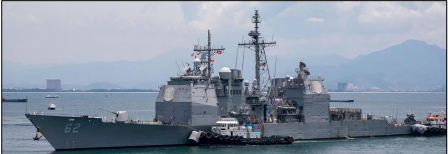
CG-47 (words) Ticonderoga Class Guided Missile Cruiser
Hurricane Bow, split superstructure, 2 mast, Mission areas → AW, USW, STW, SUW, Weapons → 2×20mm Phalanx CIWS, 2 MH-60 Helicopters
DDG-51 Arleigh Burke Class Guided Missile Destroyer FLT I/II (pic)
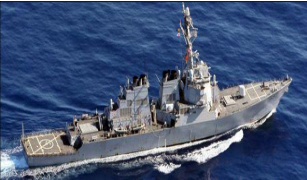
DDG-51 Arleigh Burke Class Guided Missile Destroyer FLT IIA (pic)
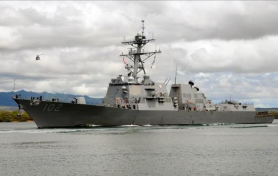
DDG-51 Arleigh Burke Class Guided Missile Destroyer FLT I/II (words)
Open bow, split superstructure, flight deck aft, mission sets→ Air Warfare, Undersea Warfare, Surface Warfare, 2xVLS, 2×20mm Phalanx CIWS, can land multitude of USN/USMC Helos, 28 officers, 254 enlisted
DDG-51 Arleigh Burke Class Guided Missile Destroyer FLT IIA
Open bow, split superstructure, flight deck aft, helo hangers mission sets→ Air Warfare, Undersea Warfare, Surface Warfare, 2xVLS, 2×20mm Phalanx CIWS, can embark 2 MH-60, 30 officers, 280 enlisted
DDG-51 Arleigh Burke Class Guided Missile Destroyer FLT III (DDG 125+) (words)
Open bow, single 5in/62 cal dual-purpose gun fwd, split superstructure, four SPY-6 array faces on superstructure, swept mast, two separate sets of stacks (1 fwd, 1 aft) Has helo hangars, Mission sets →AAW, USW, SUW, all FLT III DDGs outfitted with BMD, 1×20mm Phalanx CIWS, 2 MH-60, 35 officers, 300 enlisted
DDG-51 Arleigh Burke Class Guided Missile Destroyer FLT III (DDG 125+) (pic)
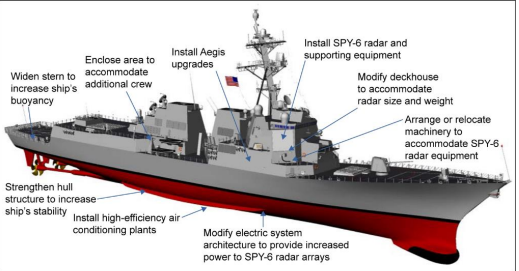
DDG 1000 Zumwalt Class Guided Missile Destroyer (pic)
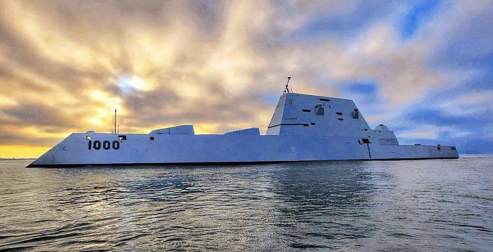
DDG 1000 Zumwalt Class Guided Missile Destroyer (words)
Wave-piercing tumblehome hull form, sustained operations in littorals and land attack, multi-mission design and littoral capabilities make it a 100% globally deployable asset to the fleet, 80x advanced peripheral vertical launch (PVLS) cells, 2xMH-60R, 1xMH-60R and 3 vertical take-off unmanned aerial vehicles, approx 160 (20 officers and 140 enlisted)
LCS Littoral Combat Ship Freedom Class (pic)
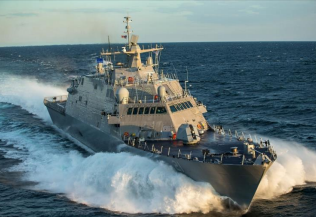
LCS Littoral Combat Ship Independence Class (pic)
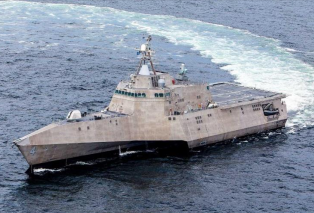
LCS Littoral Combat Ship (words)
Dual designed for max speed and shallow draft, frames can be outfitted with reconfigurable payloads, called Mission Package, 1 x 57mm Gun Rolling Airframe Missiles (RAM) Freedom variant/ SEARAM on Independence variant, 2 x 20mm guns (Surface Mission Package Only), 50-100 mission dependent
LSD-41 Whidbey Island Class Dock Landing Ship (Pic)
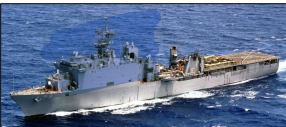
LSD-41 Whidbey Island Class Dock Landing Ship (words)
Solid block superstructure, launch amphibious craft and vehicles with Marines in amphibious assault operations, designed specifically to operate Landing Craft Air Cushioned, 2×20mm CIWS mounts, 22 officers, 350 enlisted, 402 embarked troops
LPD-17 San Antonio Class Amphibious Transport Dock (pic)
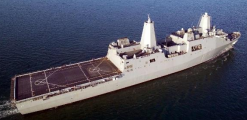
LPD-17 San Antonio Class Amphibious Transport Dock (words)
Two enclosed masts, helo hanger on flight deck, transport and land Marines, their equipment, and supplies by embarked air cushion (LCAC) or conventional landing craft, augmented by helicopters or vertical take-off and landing aircraft, 2×30mm guns, 2xRAM launchers, 10x .50 caliber machine guns, 28 officers/340 enlisted, 800 plus 102 embarked troops
LHD-1 Wasp, LHA-6 America Class landing Helicopter Dock (pic)
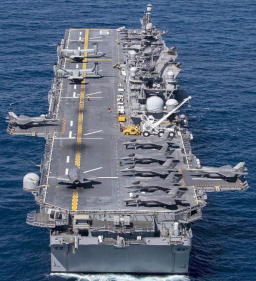
LHD-1 Wasp, LHA-6 America Class landing Helicopter Dock (words)
Flight deck along main deck, sterngate, capable of vertical/short take off and landing, short take off vertical landing, vertical take off and landing tilt rotor and rotary wing, aircraft operations; contains a well deck to support use of landing craft, air cushion, 1108 crew (104 officers) + 1894 embarked troops
Landing Craft, Utility, and mechanized - LCU (pic)
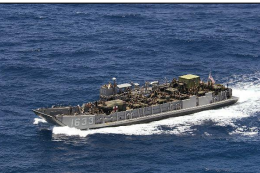
Landing Craft, Utility, and mechanized - LCU (words)
capable of transporting cargo, tracked and/or wheeled vehicles, and troops from amphibious assault ships to beachheads or piers, crew 14, Lift Capability 125 tons
Landing Craft Air Cushion (LCAC) (pic)
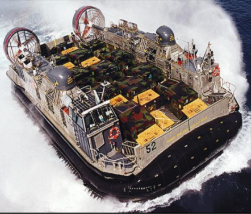
Landing Craft Air Cushion (LCAC) (words)
Large black skirt. Two large propellers aft, high-speed, over the beach, amphibious landing craft, Lift capability 60-75 tons, crew size 5
MCM-1 Avenger Class Mine Counter Measure Ship (pic)
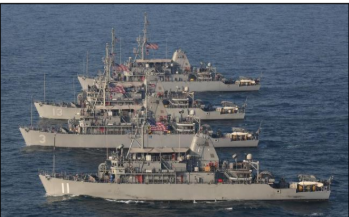
MCM-1 Avenger Class Mine Counter Measure Ship (words)
Small single deck house, crowded decks, wooden hull, designed as mine sweepers/hunter-killers capable of finding, classifying and destroying moored and bottom mines, has .50 caliber guns, 8 officers/75 enlisted
Unmanned Surface Vessels (USVs)
The Navy is expanding its _____ fleet with Medium _____ and Large _____. _____ focus on intelligence, surveillance, reconnaissance (ISR), and electronic warfare, while L_____ serve as adjunct missile magazines, carrying vertical launch system (VLS) cells to augment manned ships. Programs like the Ghost Fleet Overlord demonstrate autonomous operations, enhancing targeting, ISR, and communication relays.
DDG(X)
The ______ program is developing the Navy’s next-generation guided-missile destroyer to replace Ticonderoga-class cruisers and early Arleigh Burke-class destroyers. Featuring a new hull design, will support hypersonic missiles, directed-energy weapons (e.g., lasers), and increased power for future systems, prioritizes enhanced stealth, survivability, and endurance, with initial deliveries expected in the early 2030s.
FFG 62 Constellation-Class Frigate
____ enhances the Navy’s capabilities in distributed maritime operations. Based on the FREMM design, it features Aegis derived systems, including SPY-6 radar, 32 VLS cells, and ASW capabilities. Designed for multi-mission roles (AW, SUW, ASW, EW), the first ship is under construction, with commissioning planned for 2026
Laser Weapon Systems
These systems neutralize drones, small boats, and cruise missiles with unlimited “ammunition” as long as power is available. HELIOS also provides ISR and dazzling capabilities. The Navy is scaling laser power to counter advanced threats, with wider deployment planned by 2030. _______ such as the High Energy Laser with Integrated Optical-dazzler and Surveillance (HELIOS), are deployed on ships like USS Preble (DDG 88) and USS Portland (LPD 27).
Hypersonic Weapons
The Conventional Prompt Strike (CPS) program equips surface ships with hypersonic missiles, capable of Mach 5+ speeds, for precision strikes against time-critical targets. DDG(X) and Zumwalt-class destroyers are primary platforms, with CPS integration ongoing to counter peer adversaries like China and Russia.
Directed Energy and Electronic Warfare
Navy is developing microwave-based directed- energy weapons to disrupt enemy electronics. Upgrades to the AN/SLQ-32 electronic warfare system enhance jamming and deception against advanced radar and missile threats, equipping ships like Arleigh Burke-class destroyers and Constellation-class frigates.
Boatswain Mate (BM)
Responsible for all topside maintenance, deck gear operation, small boats and seamanship. On ships without an air department, responsible for all aviation operations to include landing and launching aircraft.
Operations Specialist (OS)
Responsible for monitoring radar systems, communication link systems and back up navigation inside of Combat Central.
Cryptologic Technician Technical (CTT)
Responsible for monitoring and prosecuting electronic signals emitted by other targets as well as electronic countermeasure systems.
Quartermaster (QM)
Responsible for the safe navigation of the ship, and preparing all navigation routes.
Gunner’s Mate (GM)
Responsible for care and maintenance of all small arms, crew served weapons and other installed weapon systems as well as ammunition.
Sonar Technician Surface (STG)
responsible for the operation of the ship’s sonar suite as well as anti-submarine warfare.
Fire Controlman (FC)
Responsible for the operation and maintenance of weapon targeting systems, to include the Aegis Weapon System.
Electronics Technician (ET)
Responsible for the maintenance and operation of all combat system electronic equipment, to include radars, radios and navigation positioning systems, less the SPY-1/6 Radar.
Information Systems Technician (IT)
Responsible for the operation and maintenance of the ships LAN and computer systems.
Engineman (EN)
Responsible for the operation and maintenance of all diesel engines and their sub systems.
Gas Turbine Systems Technician Mechanical (GSM)
Responsible for the operation and maintenance of the ship’s installed gas turbine engines, less the electronic control systems
Gas Turbine Systems Technician Electrical (GSE)
responsible for the operation and maintenance of the Gas Turbine electronic control systems.
Electrician’s Mate (EM)
responsible for the distribution and maintenance of electrical power systems throughout the ship.
Machinist’s Mate (MM)
Responsible for the maintenance and operation of all auxiliary engineering systems onboard to include water, air and hydraulic systems.
Damage Controlman (DC)
Responsible for the maintenance and operation of all installed and portable damage control gear located throughout the ship.
Hull Technician (HT)
Responsible for the physical structure of the ship. Their specialties include welding, brazing and repair of broken tools and equipment.
Retail Service Specialist (SH)
Responsible for operation of the ships store and support services such as laundry, and hotel services.
Logistic Specialist (LS)
Responsible for ordering and maintenance of stock control of all required spare and replacement parts.
Culinary Specialist (CS)
Responsible for the order and stock control of food, and well as meal prep for the entire crew 3 times a day.
Yeoman (YN)
Responsible for the processing of all administrative tasking as well as personnel reporting requests.